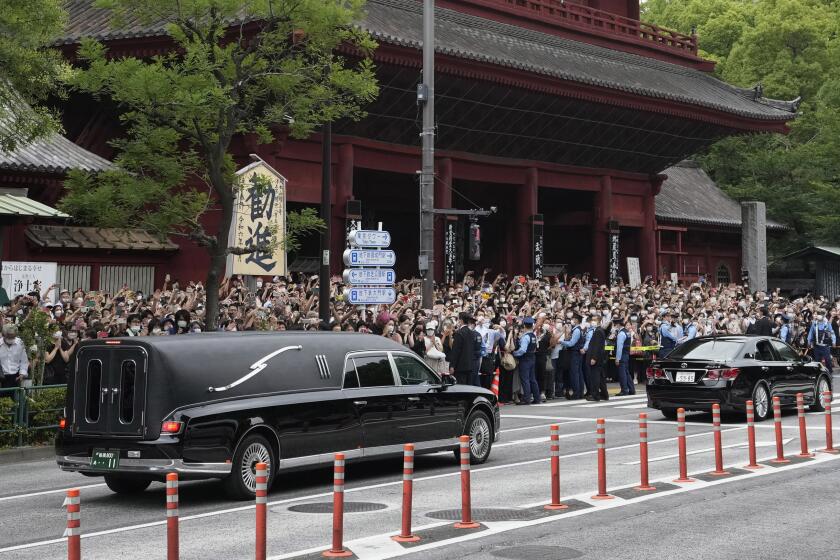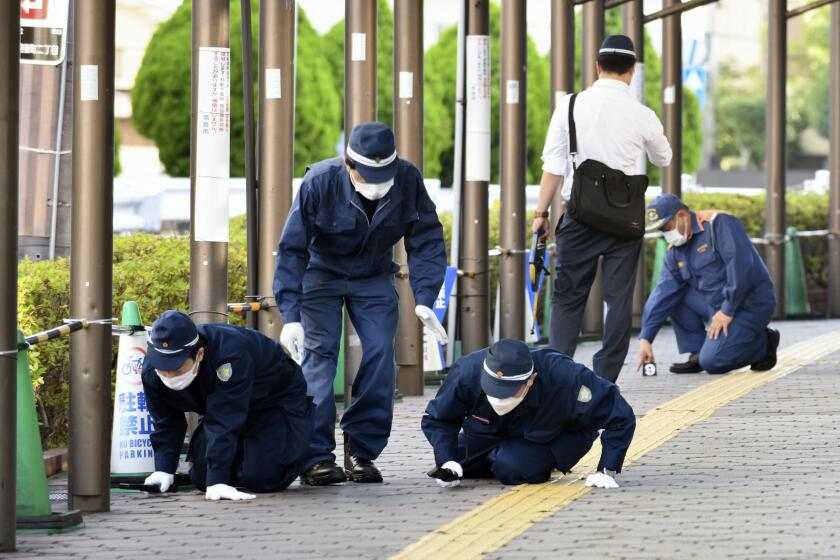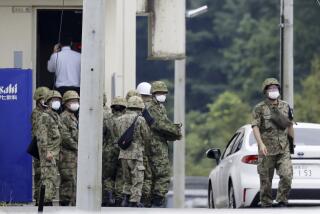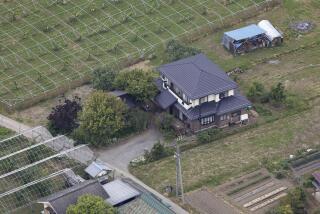Japan’s national police chief resigns over assassination of Shinzo Abe
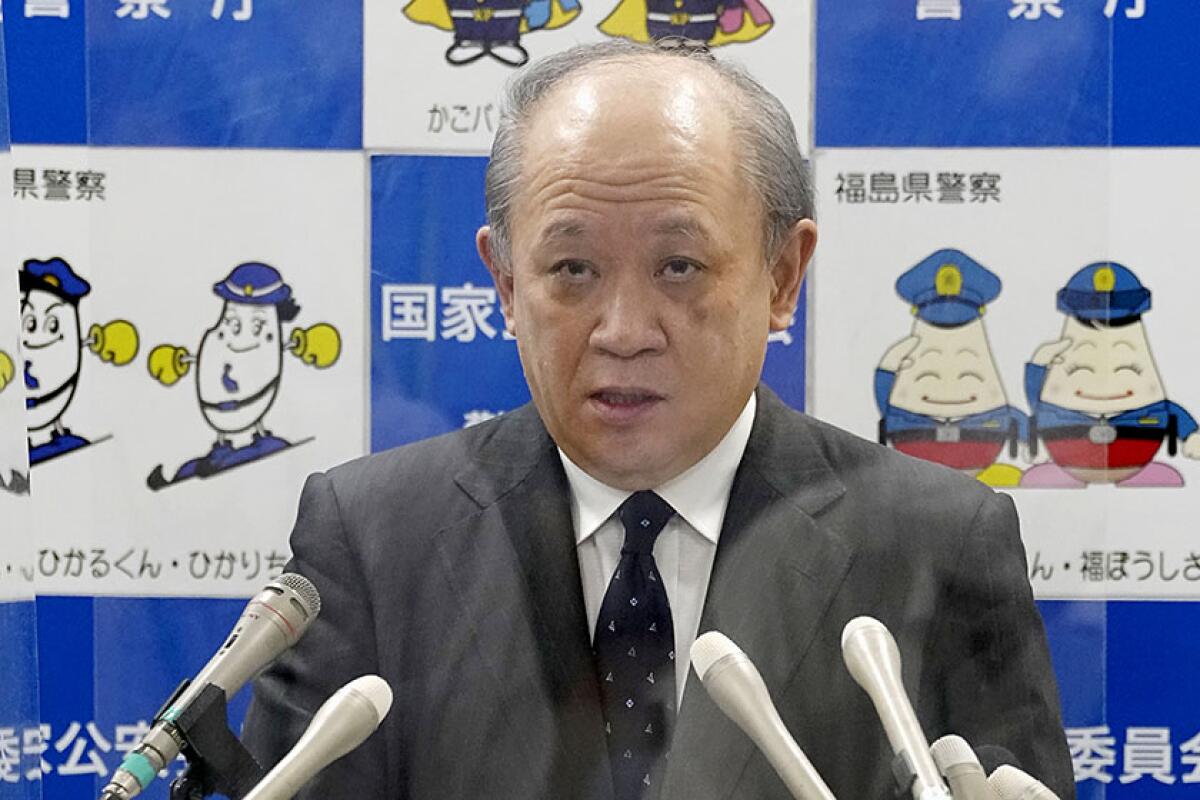
TOKYO — Japan’s national police chief said Thursday he would resign to take responsibility for the security lapses that allowed a gunman to fatally shoot former Prime Minister Shinzo Abe at a campaign event last month.
National Police Agency Chief Itaru Nakamura’s announcement came as his agency released a report blaming flaws in police protection — from planning to guarding at the scene — that led to Abe’s assassination July 8 in Nara, in western Japan.
Nakamura said that he took the former prime minister’s death seriously and that he submitted his resignation to the National Public Safety Commission earlier Thursday.
“In order to fundamentally reexamine guarding and never to let this happen, we need to have a new system,” Nakamura told a news conference as he announced his intention to step down.
Nakamura did not say when his resignation would be official. Japanese media reported that his resignation is expected to be approved at Friday’s Cabinet meeting.
The alleged gunman, Tetsuya Yamagami, was arrested at the scene and is under mental evaluation until late November. Yamagami told police that he targeted Abe because of the former leader’s link to the Unification Church, which Yamagami hated.
A family funeral was held in Tokyo for former Japanese Prime Minister Shinzo Abe, who was gunned down Friday during a campaign speech.
Abe sent a video message last year to a group affiliated with the church, which experts say may have infuriated the shooting suspect.
In its 54-page investigative report released Thursday, the National Police Agency concluded that the protection plan for Abe neglected potential danger coming from behind him and merely focused on risks during his movement from the site of his speech to his vehicle.
Inadequacies in the command system, in the communication among several key police officials and in their attention to areas behind Abe at the campaign site led to their lack of notice of the gunman’s movements until it was too late.
None of the officers assigned to immediate protection of Abe noticed the attacker until he was already about 23 feet behind Abe, where he took out his homemade double-barreled gun, which resembled a camera with a long lens, and fired his first shot, which narrowly missed.
The marks on a building near where the former prime minister was slain were apparently from the first shot fired by the gunman. The second was fatal.
In slightly more than two seconds, the gunman was only 17 feet behind Abe and fired the fatal second shot.
The report called for significant strengthening of both training and staffing of Japan’s dignitary-protection service, as well as revising police protection guidelines for the first time in about 30 years. It said the prefectural police’s Abe protection plan lacked a thorough safety evaluation and largely copied an earlier visit by another top party lawmaker.
The national police called for doubling dignitary-protection staff, a greater supervisory role for the national police over prefectural staff, and the use of digital technology and drones to bolster surveillance from above. The police agency also proposed bulletproof shields that are not yet used in Japan, a country known for strict gun control.
Abe’s family paid tribute to him in a private Buddhist ritual Thursday marking the 49th day since his assassination. His younger brother, who is a former defense minister, and other senior party officials and ministers reportedly attended.
Breaking News
Get breaking news, investigations, analysis and more signature journalism from the Los Angeles Times in your inbox.
You may occasionally receive promotional content from the Los Angeles Times.
About 1,000 people, including Prime Minister Fumio Kishida, attended an earlier private funeral at a Tokyo temple days after Abe’s death.
Kishida’s government plans to hold a state funeral Sept. 27, a plan that has split public opinion amid growing criticisms over the governing party members’ cozy ties with the controversial Unification Church. Kishida’s Cabinet is reportedly announcing a $1.8-million budget to invite 6,400 guests from inside and outside Japan for the upcoming funeral.
The Unification Church, which was founded in South Korea in 1954 and came to Japan a decade later, has built close ties with a host of conservative lawmakers, many of them members of Abe’s Liberal Democratic Party, over a shared antipathy to communism.
Since the 1980s, the church has faced accusations of problematic recruiting and religious sales in Japan, and the governing party’s church ties have sent approval ratings of Prime Minister Fumio Kishida’s Cabinet into a nosedive even after its recent shuffle.
News Alerts
Get breaking news, investigations, analysis and more signature journalism from the Los Angeles Times in your inbox.
You may occasionally receive promotional content from the Los Angeles Times.
In Nara on Thursday, the prefectural police chief, Tomoaki Onizuka, also expressed his intention to step down over Abe’s assassination.
“I have been almost crushed by the seriousness of my responsibility” in the former leader’s death, a tearful Onizuka said. “We will grit our teeth and endeavor in order to regain the public trust and be helpful to the people in the prefecture and across Japan.”
More to Read
Sign up for Essential California
The most important California stories and recommendations in your inbox every morning.
You may occasionally receive promotional content from the Los Angeles Times.
